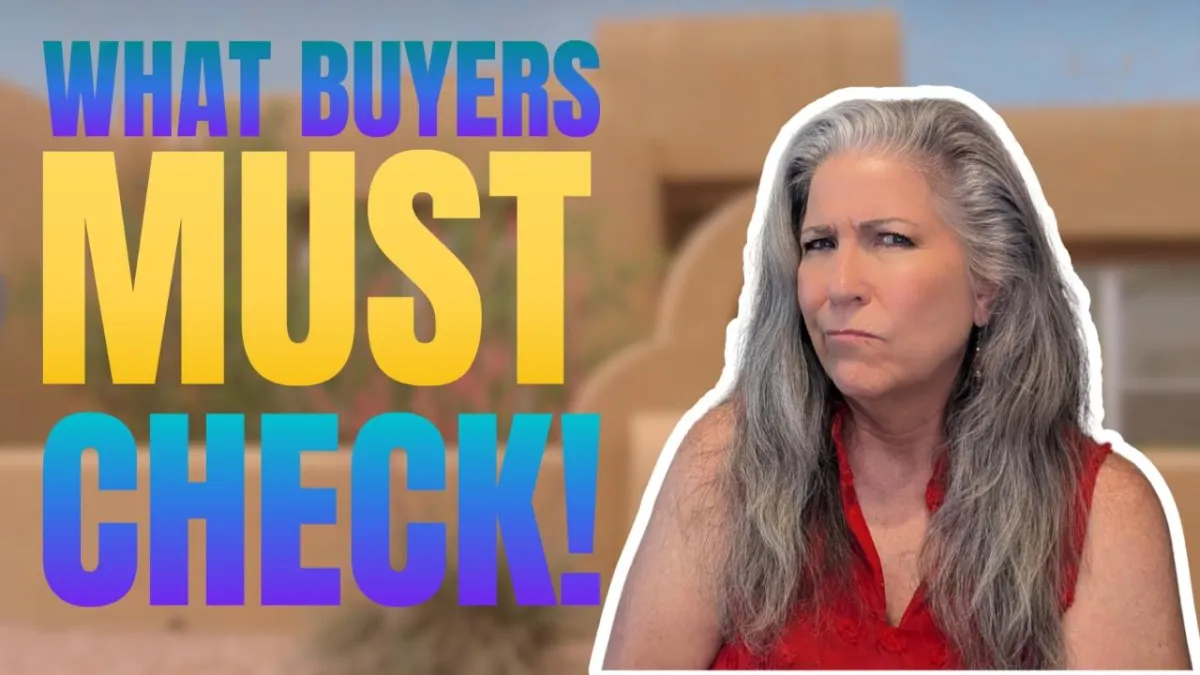
What Every Buyer Must Know Before Closing
👉 Watch the full video on YouTube!
Prefer to listen? Click to hear this post!
What Every Buyer Must Know Before Closing
[00:00:00] All right. Now let's talk about the home inspection for buyers.
The home inspection for buyers is a super important stage of the process and it's not just the home inspection, it's the due diligence period, which is from the first day you go under contract. To however many days your realtor negotiates for you. Standard in Arizona written into the contract is 10 days.
but it can be shorter or it can be longer, whatever seems to be the need for that property. And depending on the need, like I just have one now that had to have water tests and in Arizona. If you're a VA loan, and I think also FHA, but for sure va, you need to have the water tests done and they have [00:01:00] to pass for the loan to proceed.
And obviously if the water tests don't pass and it comes back with high lead, e coli, arsenic, any of those things that are bad. then we have to negotiate with the seller on resolving the problem, or you have to cancel because you don't own the house. There's nothing you can do. So if the seller's not willing to address the problem, you gotta cancel.
so it's kind of a rough spot in the whole due diligence period. thankfully my last one just passed. I knew the house 'cause I had helped the seller buy it, so I was pretty sure that the Water filtration system was okay and is was continuing to resolve any issues. And it did. but typically home [00:02:00] inspections, the period, the due diligence period is 10 days.
And during that period of time, the buyer has the right to schedule and do. Any and all inspections that they want to or need to do for lender requirements on the property. So that would be standard home inspection. So there's the home inspector looking in every nook and cranny of your house, I mean, every nook and cranny of your house.
They test everything. and what I may do is put a, I think I'll do this, is put a. So to speak, redacted. I will take the address and people's names out, but I will give you a home inspection so you can see just how detailed they can get. And some home inspectors are even more detailed than others, so just keep that in mind.
As I said, home inspectors can kill a deal because it scares the seller buyer. There's [00:03:00] too many things on the list and like, oh my lord. And of course, keep this in mind. A home inspector will put. For electrical, roof, everything. And I'm talking everything, even a light bulb missing, please check with a certified professional.
It's a light bulb, but they have to, to cover their, you know what? Their booty, so they put that on everything, which scares people away. Like, oh my God, I have to an electrician come out and check this out. Outlet, make sure it's working. Or this light fixture. I know you put a bulb in there, it's okay, but it can scare people.
So we have to be very. aware of that as the seller and as agents, both sides, we need to really work closely with our clients so they understand. So we've got the home inspection, we have the termite inspection, and the termite inspection is pretty easy and again, if it shows up that there's termites, the seller is responsible for addressing that period.
Again. I have a client right now who's just like on Johnny [00:04:00] on the spot and she. Has already had the pest control company that comes out once a month, check her house for termites, and they've already said there aren't any, which is a good thing because then if this buyer says, oh no, my termite inspector found termites.
Be like, where? Because I just had that checked and we didn't have any. So sometimes you do have to have some stuff to protect yourself. So again, they can have the HVAC company come out and check your hvac, especially if it's older. they can have somebody come out and look at the roof. And usually if we have concerns about the roof, we're gonna wanna have at least two estimates or at least two roofing companies come out and look.
You don't wanna go by just one. And honestly, I'm just gonna be honest. Roofing companies can be a little questionable. So I always like to have at least two and often three estimates on roofs because I'm just saying roofing companies can be not always the most honest. And I, and I have examples [00:05:00] of that.
And then, brain went somewhere. talking about I'm on vacation. My brain does not wanna play this game today. so those are the primary inspections. Home inspection, termite inspection, well inspection, roof, hvac, that type of thing. If there's a serious question maybe in regards to the electrical panel or any electrical issues, you could have an electrician come out.
I've only had. I only think I've had one property that I was working on that the electrical was a little sketchy. And part of the reason that we wanted it checked by an electrician was also because
The potential buyer was looking at expanding and maybe using that space and making a bigger kitchen type thing. And they wanted make sure, do I have to add to the electrical box? But it, again, it was a really old property, so we just [00:06:00] wanted the electrical check. but once the home inspection comes back.
To the buyer. The buyer sits all these inspections. We'll get all the inspections and we share all that with the seller and the agent. So the buyer's agent, the realtor for the buyer, shares that with the listing agent. The listing agent shares it with the seller. So there's no surprises. Like, what are you asking for?
Where is this? I don't see it. so they have all the information and then we sit down and go through it in detail. And I'm looking for problems. And that's part of the reason that I always tell. Why are you following your clients so closely? I am. I am looking for issues. I'm looking for issues because that is gonna impact the offer.
It is. And a buyer comes in and goes, oh my God. Oh, it's so beautiful. I just love it. I love it. And [00:07:00] that's great. We want him to say that. However, I'm coming along going, did you notice that closet door doesn't close properly? It's not aligned properly. did you notice that that looks like there was a leak over there in that corner and there's, you know, grouts missing all around the tub.
Tiles are loose, that sink is leaking. I can see. I mean, look at that. Just stuff. And I am responsible to help them make a good offer out the gate, not negotiate, reducing the price or credits later. We wanna re, we wanna make an offer based on the house as we see it. So I'm looking for trouble, I'm looking for problems which is easy for me because
I just, I, it's just what I do. I always am looking for where are the issues, where are the problems? this is not the best video, like lighting. I'm so sorry, but I'm outside and I don't, I don't have my little extender thing and I don't have my ring light. So this is what [00:08:00] you get people oh, it's kind of the best spot.
I like it. So that's part of why I follow my clients around so closely is that I'm not ing an eye, but I do point out things that are good things about the house too, so that they're not, so that they're seeing the whole picture, the big picture. so we get the home inspections, we get all those inspections, we're gathering all this stuff, we're getting the estimates if we had those.
But we're sending the inspection reports as we get them. We don't send the estimates yet. So my clients and I, we sit down, we go through all of the inspection information we've got, and I always tell my clients, and I don't know that this is how all agents do it, but honestly, if you want to buy the house, you want the deal to keep going and you don't wanna piss off the seller or offend the seller or you know, go, oh my God, now [00:09:00] I have to decide they're not gonna do anything.
Do I keep it? Do I? Yeah. We'll get to that part. So I tell my clients, focus on the big ticket items, big ticket items, first roofs, hvac, water heaters, major flooring issues, windows paint. Again, things that are going to make or break. You as the buyer, like expense-wise, and two, have to be addressed for the loan.
So if there's peeling paint and loose, board, say on a deck or patio or steps. I actually had one where there was no railing on the patio and it was like three and a half feet off the ground. Like if you fell off the edge of that, it was going to hurt when you landed. And they had to put up railings to pass the VA appraisal.
So it, these are things you call out. [00:10:00] These are the things they have to fix so the, the buyer can proceed with the loan. I mean, it's not optional. And, and there's ways we can work with that and, and put some money in the offer to reimburse the seller for some things. But that's a whole nother story. So we focus on the big ticket items.
and then realistically, if you're gonna be a homeowner, you gotta be willing to do some minor repairs. I'm just saying now, the worst clients I've ever had are people that are in their fifties that have rented their whole life, whole life. They have never owned a house, and they moved into houses that were completely cleaned out and anytime there was something that wasn't working, they just called the landlord and they fixed it.
And those were my worst clients because they expected everything on that home inspection to be fixed. [00:11:00] Because that's what you're supposed to do, like a landlord. And I'm like, that's not what sellers do. But those were my worst clients 'cause they just didn't understand that this is not a landlord tenant situation.
You know? This is not a, I'm walking in noting all the issues so that you, I don't get in trouble for 'em later when I move out. Worst, worst clients ever. Anyway. So you focus on the big ticket items, little things. We talk about, is it something that's gonna cost you money, like hiring somebody to fix it? or is this thing in yourself, you know, replace that out.
Light switch cover that's broken, you know, caulk around your tub. Learn how to use that. caulking gun. You know, being a homeowner means you gotta learn. DIY. Okay, but you're not gonna be out there fixing your hvac, you're not gonna be out there climbing on your roof, I hope. you're, you're not gonna be replacing your water heater.[00:12:00]
So you definitely want those things addressed. And what we do is we write the list of things we want the seller to address. If we have estimates on the repairs, we send them with the buyer inspection notice. And then you ask. For the seller to repair, replace, or remove X items, and that's back and forth.
You and the other realtor are gonna be talking to try and negotiate a good deal that's gonna keep things together, versus you send it and you never talk to each other, that's gonna end badly because I want my client to get their house. I want them to get their house so we have that conversation. And because of that conversation, when the seller's response comes back to us, it's a response that I can present to my buyer and pretty much know [00:13:00] that they're gonna say yes.
Because when that response comes back from the seller, your client, the buyer has two choices. Yes, I accept the seller's response, or no, I don't. And I'm canceling the deal. And that's a hard one. That's a hard one because, I mean, some sellers are not reasonable because they're like, oh, why should I fix it?
I'm not gonna be living there. But do you wanna sell your house? And two, why would you expect the buyer who has just spent all this money on inspections and appraisal down payment closing costs? To come up with another few thousand dollars to repair something in your house that you've been living in for 30 years.
Those are my worst clients too. Or some of the people that live in their homes forever and are not great at maintenance. Like, well, I'm not gonna be living here. I ain't spending no money on that. I have no money. Well, we gotta [00:14:00] figure out something. So it's really in the best interest of both the seller and the buyer to come together.
And agree to something that's gonna work. Now, sometimes a seller can't afford to fix things, and if they can't afford to fix it and it's not something that's gonna get in the way of an appraisal and it doesn't make the house unlivable, then the seller can do a credit to the buyer, and then that's less money the buyer has to bring to the table, which means they then have the money to do the repair.
It is fair. another way around it is that the seller's like, I will do the repair. I will do the fix, but I need the money back. And then at times we have increased the purchase price, obviously not outside of what the appraisal will allow. [00:15:00] And that money then. Sorry about that. then the money, so you say you increase, you need to get the paint done so that it passes the appraisal and the paint is gonna cost $3,000 to get the parts that need to be painted.
Painted. And I'm talking peeling paint or a deck that needs to be repaired. And so we increase the purchase price by 3000. The seller has to put the money out on the front end unless the vendor's willing to be paid through escrow, which does happen from time to time, but you can't guarantee that. and then that $3,000 extra that you paid in purchase price goes back to the seller to reimburse them for the repair that they did.
That's an example. So there's ways to work with it. You if a, if your client loves the house and the seller wants to sell, or if I have the seller and they're like, yes, I really wanna sell this thing. I need to get it off my, I [00:16:00] need it to be gone, then we will work it out. We will work it out because it's the most important thing.
Now I, here's what you have to remember. Very important. Your buyer has one house they wanna buy, and your seller, your seller has one house they want to sell. I have many buyers. I have many sellers. I have a lot of houses I'm working with. They each have one. It's very important to them. Very important. This is the house, their only house they're focused on.
So it's our responsibility to make sure that we do everything that we can ethically, legally, in our skillset to keep things moving forward. I hope that this was helpful. it can, home inspections, that due diligence period, can make or break a transaction, a, a [00:17:00] sale of a home. A purchase of a home. And so I really can't stress enough being prepared as a seller and being prepared as a buyer to be reasonable on both sides really.
Because ultimately the goal is to sell your house. If you put it on the market, I would hope. Ultimately your goal is to sell the house and if you are interested and put an offer in on the house, that ultimately your goal is to buy that house. Okay. So that's that's my. Two pieces, two bits, whatever opinion, recommendations, suggestions, regarding home inspections and how to work through that, how to prepare for that, how to be thinking about that process.
'cause it's, it is the most important part potentially in making or breaking a deal once it's under contract. All right. Have a blessed and glorious day. I am now going to return to [00:18:00] my vacation and we'll see you on the other side.
💡 Ready to take the next step?
📘 Grab our free guides to help you make a smart purchase:






